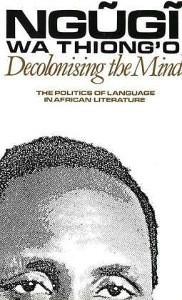 “Decolonizing the Mind: The Politics of Language in African Literature” is the work of noted Kenyan author and postcolonialism theorist Ngũgĩ wa Thiong’o.
“Decolonizing the Mind: The Politics of Language in African Literature” is the work of noted Kenyan author and postcolonialism theorist Ngũgĩ wa Thiong’o.
In his collection of essays, Ngũgĩ wa Thiong’o addresses language and its constitutive role in national cultures, historical processes, and identity formation. He argues for Lingusite decolonization.
The volume is divided into four essays, which repeatedly include parts from lectures given by the cultural scientist:“The Language of African Literature,” “The Language of African Theatre,” “The Language of African Fiction,” and “The Quest for Relevance .”
His central thesis is that of language as communication and as culture; both establish each other.
“Communication creates culture: culture is a means of communication. Language carries culture, and culture carries, particularly through orature and literature, the entire body of values by which we come to perceive ourselves and our place in the world. How people perceive themselves and affects how they look at their culture, at their places politics and at the social production of wealth, at their entire relationship to nature and to other beings. Language is thus inseparable from ourselves as a community of human beings with a specific form and character, a specific history, a specific relationship to the world.”
“Decolonizing the Mind” offers a distinct anti-imperialist perspective on the ongoing language debate and on the role language takes in the context of imperialism and neocolonialism and how to combat them. The work also specifically addresses the “language problem” with which African authors are confronted. This is interpreted as Ngũgĩ wa Thiong’o’s “Farewell to English.”
Ngũgĩ wa Thiong’o 1986: Decolonising the Mind: The Politics of Language in African Literature. London: J. Currey.
The volume of essays has also been available in German since October 2017:
Ngũgĩ wa Thiong’o 1986: Decolonization of Thought. Essays on African Languages in Literature. Münster: Unrast.
If you don’t have a bookstore worth supporting near you, you can also buy the book from the alternative non-profit online bookstore links-lesen.de, which supports political projects with the profits. The link to the book is here.
